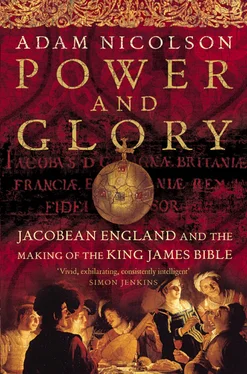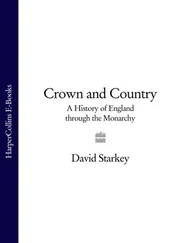It was charming, crafty, complicit, flattering, collusive, the speech of a politician three decades on a throne. A smile hangs about the words, his doffing of his hat to God surely a witticism, the description of England as the promised land surely an act of flattery to the Englishmen around him.
The bishops, too, began emolliently. Poor old John Whitgift addressed the king on his knees as they discussed technical points about baptism, confirmation, the too frequent use of excommunication. Whitgift and Bancroft quoted both the Bible and âMr Calvinâ. James congratulated himself on his own moderation. It was only a matter of months ago, he told them, that he was berating a Scots minister on not paying enough attention to the rite of baptism; now he had to instruct these English bishops on revering it too highly. Again, there is that Jamesian note of seriousness and jokiness lying unresolved together.
The kneeling bishops insisted that the Church of England as it had stood these last forty years was as near the perfect state of the primitive church as any in the world. And if the church had persisted well enough for forty years, then why the need to change anything? Suddenly this was too much, and James could be patient and politic no longer: âIt was no reason that because a man had been sicke of the poxe 40 years, therefore he shoold not be cured at length.â
It was a coarse interjection: had anyone previously compared the Church of England to a man with the clap? James, clearly, was not entirely reliable, unwilling to be boxed into the conservative, anti-Puritan compartment the bishops would have liked. History may have confined James to a proto-absolutist, Divine Right of Kings advocate, but the reality, inevitably, was more complicated. To the bishopsâ horror, James began to lecture them, âplaying the puritanâ as Andrewes later described it. They were not to pursue Nonconformists with the violence they were accustomed to (this was aimed at both Whitgift and Bancroft for their stamping out the English Presbyterians under Elizabeth) but were to treat them âmore gently than euer they had don beforeâ. These statements were politically canny â the bishops were still unsure where James stood â and were a means of establishing him as the holder of the ring, the Solomon-like judge and arbiter who belonged to no one side. Anyway, the questions implied, why did these bishops think that their church, unlike any other human institution, was not corrupt and in need of repair? What arrogance was that? Wasnât everything in this world subject to decay and decline? Where did they think they were? In some kind of perfected heaven? The atmosphere of the conference had suddenly sharpened.
In the discussion on baptism, the Bishop of Peterborough then made a fool of himself. Apropos of nothing much, he said that he knew of one case in which an ancient father had baptised with sand instead of water. âWhereto his Majesty answered pleasantly, âA turd for the Argument. He might as well have pissed on them, for that had been more liker to water than sand.ââ The bishopâs reputation never recovered. Bancroft, who in his organisational ability could exercise a cold rationality but who could also turn intemperate and angry, ânow spake with too ruf boldnessâ. He had been goaded by the figure before him of James Mountagu, Dean of the Chapel Royal.
Mountagu embodies all the unclassifiability of Jacobean attitudes to state and religion, to holiness and power. He would in time become both a Translator and a bishop. He edited, with a lake full of obsequiousness, the kingâs own collected works. He was a beautifully mannered aristocrat, with one brother an earl, the other a baron. He sounds like a Cavalier in the making. Surely a figure such as Mountagu should have been repulsed by Calvinist severity and strictness, by the whole notion of Puritanism? He wasnât. He was deeply sympathetic to the reformist camp, having been Master of the Puritan Sidney Sussex College in Cambridge. At this period, at the head of each of his letters, he used to put the word âEmmanuelâ, meaning âGod be with usâ, a signal among the stricter sort of the supremacy of scripture over the worldly structures of the church. He did his best to promote the hotter Protestants within the church and would not accept any kind of lush ceremonial, nor any hint of a drift back to Rome.
Bancroft loathed him. For Bancroft, bishops and the accustomed hierarchy were agents of the divine. The true church couldnât hope to rely on the Bible alone. Almost no one understood what it meant and so people like Mountagu represented a most alarming subversion of the order on which civilised life relied. Now their simmering hostility boiled over. At one point early that afternoon, when the dean leaned over and whispered in the kingâs ear â he was giving him some details on ancient baptism â Bancroft could contain himself no longer. âSpeake out, Mr Doctor, and do not crosse us, underhand,â he shouted violently across the room. Barlow would report none of this.
They had been talking for three hours. It was not a good atmosphere. This was a court that knew everything about duplicity and politicking, constantly aware of the unreliability of language and men, of whisperings in ears and comments muttered behind the hand, but which nevertheless valued a courteous surface, the smooth and upholstered working of the demands of power. Robert Cecil, a well-honed liar, sitting with the Council to one side, said nothing. Sitting among the deans, Lancelot Andrewes, who had often preached against the very offences of pluralism and nepotism which he and all the others practised, remained silent. And Bancroftâs faux pas allowed James to resume his unique combination of Solomon-like distance and joky vulgarity. Religion, he told them, was the soul of a kingdom, and unity the life of religion. He would clear up some doubts, he would have a few passages changed in the prayer book, in the rubrics rather than the body of the text, âto be inserted by waie rather of some explanation than of any alteration at allâ. He would see the Puritan party on Monday morning. He was not looking forward to it: âhowsoeuer he lived among Puritans , and was kept for the most part, as a Ward under them, yet, since hee was the age of his Sonne, 10. years old, he euer disliked their opinions; as the Sauiour of the world said, Though he liued among them, he was not of them .â
With that breathtaking comparison between his own position and Christâs walking among the heathen, James dismissed the bishops and deans. It was a confession that, in effect, he had been playing with them. He may have appeared to be taunting them with the very charges the Puritans were laying against them, but, when it came to the point, James wanted to buttress the established church. Nevertheless, Solomon-like to the end, he was anxious that the established church itself should be cleansed of impurities. It is the classic Jamesian position: self-congratulatory, vain, and perhaps, in the end, surprisingly, and against the odds, rather wise.
On Monday, the tactics were exactly and intelligently handled by James to put the burden of proof on the Puritans. Unless they could show that there was something in scripture explicitly condemning the bishopsâ administration of confirmation, or the use of the cross in baptism, or of the ring in a wedding service, or kneeling to receive communion, or the wearing of the surplice, or about the institution of episcopacy itself, he would not interfere with the accustomed ceremony or government of the church. That church, for all its abuses, was a comfortable bed in which to set a monarchy. Any radicalisation of it, diminishing the power and status of the bishops, or replacing them with presbyteries, inherently argumentative and overweening groups of know-all elders or presbyters, would, in essence, be too Scottish. The last thing he wanted was a return to the horrors north of the border. Presbyteries represented everything he most loathed and despised.
Читать дальше












